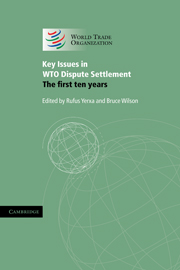Book contents
- Frontmatter
- Contents
- Notes on contributors
- Preface
- Table of cases
- Abbreviations
- PART I Introduction and General Considerations
- PART II The WTO Dispute Settlement System: Its Processes and Its Institutions
- PART III The WTO Dispute Settlement System: Systemic and Other Issues
- 12 The role of lawyers in the WTO dispute settlement system
- 13 Jurisdiction in WTO dispute settlement
- 14 Due process in WTO disputes
- 15 Standards of review in WTO panel proceedings
- 16 Administration of evidence in WTO dispute settlement proceedings
- 17 Confidentiality issues under the DSU: fact-finding process versus confidentiality
- 18 Panels' consultations with scientific experts
- 19 Amicus curiae participation in WTO dispute settlement: reflections on the past decade
- 20 Suspension of concessions and retaliation under the Agreement on Safeguards: the recent US – Steel Safeguards case
- 21 Compliance with WTO dispute settlement decisions: is there a crisis?
- 22 DSU review: a view from the inside
- PART IV Annexes
15 - Standards of review in WTO panel proceedings
from PART III - The WTO Dispute Settlement System: Systemic and Other Issues
Published online by Cambridge University Press: 04 August 2010
- Frontmatter
- Contents
- Notes on contributors
- Preface
- Table of cases
- Abbreviations
- PART I Introduction and General Considerations
- PART II The WTO Dispute Settlement System: Its Processes and Its Institutions
- PART III The WTO Dispute Settlement System: Systemic and Other Issues
- 12 The role of lawyers in the WTO dispute settlement system
- 13 Jurisdiction in WTO dispute settlement
- 14 Due process in WTO disputes
- 15 Standards of review in WTO panel proceedings
- 16 Administration of evidence in WTO dispute settlement proceedings
- 17 Confidentiality issues under the DSU: fact-finding process versus confidentiality
- 18 Panels' consultations with scientific experts
- 19 Amicus curiae participation in WTO dispute settlement: reflections on the past decade
- 20 Suspension of concessions and retaliation under the Agreement on Safeguards: the recent US – Steel Safeguards case
- 21 Compliance with WTO dispute settlement decisions: is there a crisis?
- 22 DSU review: a view from the inside
- PART IV Annexes
Summary
Introduction
Whenever WTO panels are called upon to examine a WTO Member's measure or law, the question of the applicable standard of review arises. In some cases, the issue is clear and not argued by the parties. In other cases, the substantive out come of the dispute may well depend on the standard of review applied by the panel. Not surprisingly, a routine criticism by WTO Members who have lost disputes in Geneva has been that panels have applied the wrong standard of review because it was either too intrusive or too deferential. Claus-Dieter Ehlermann, who served as member and Chairman of the Appellate Body from 1995 until 2002, noted at the end of his term in office that ‘the question of standard of review has become one of the most controversial areas of Appellate Body jurisprudence’.
The issue of standard of review is very much part of procedural law in general. It plays an important role in the judicial review of administrative authorities' measures in both domestic and international jurisdictions. However, standards of review fulfil not only a procedural function but can also represent a deliberate allocation of power between an authority taking a measure and a judicial organ reviewing it. In the context of the WTO, the political and systemic significance of standards of review is self-evident. They are an important factor in determining the appropriate relationship between WTO legal obligations and national sovereignty.
- Type
- Chapter
- Information
- Key Issues in WTO Dispute SettlementThe First Ten Years, pp. 161 - 176Publisher: Cambridge University PressPrint publication year: 2005
- 2
- Cited by



